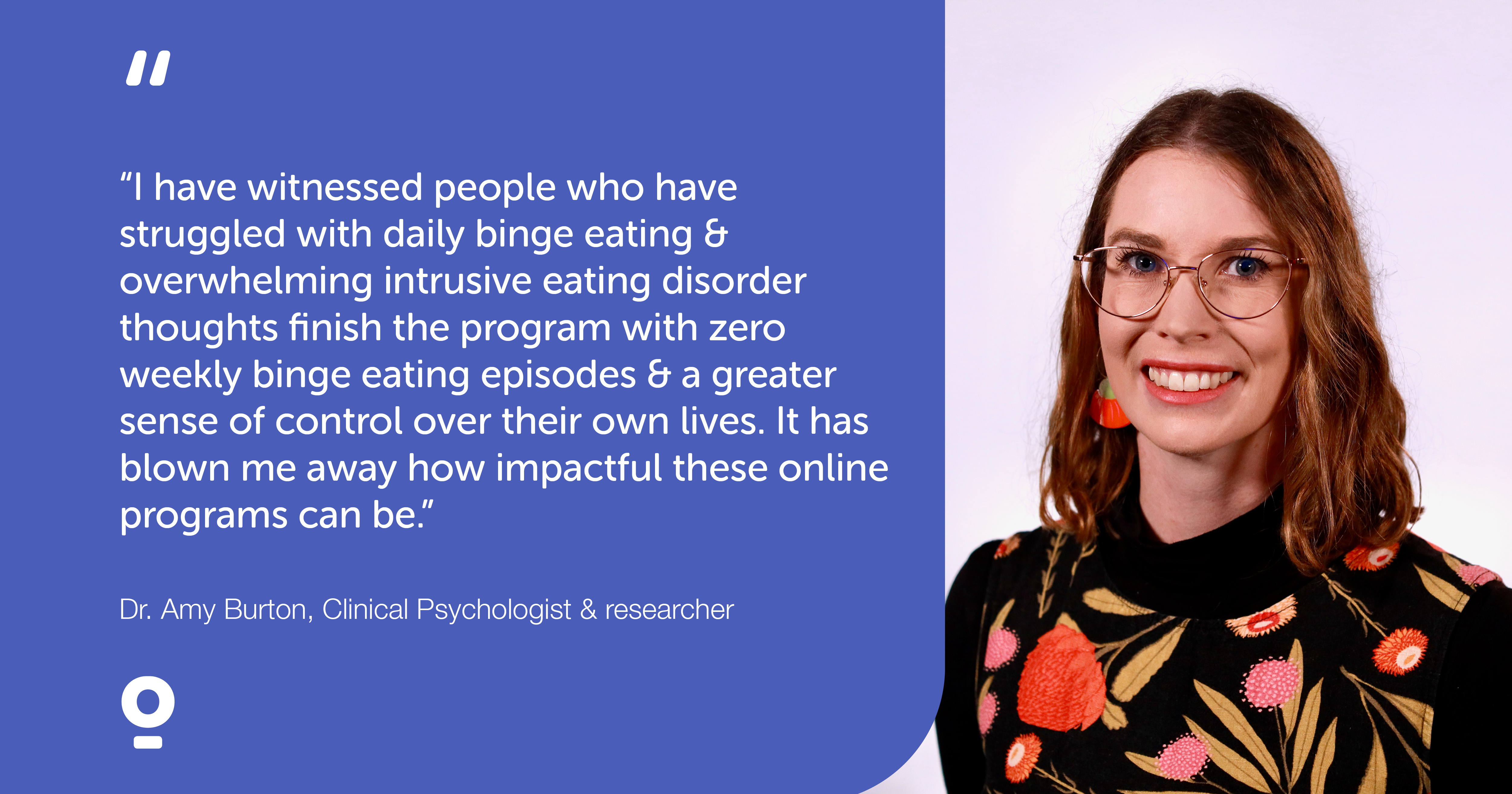“Back in the Driver’s Seat”: How one clinician is using InsideOut’s digital programs to transform eating disorder care in the community.
Dr Amy Burton is a practicing clinical psychologist, credentialled eating disorder (ED) clinician, and lecturer in clinical psychology at the University of Technology Sydney (UTS) and the University of Sydney. As a clinician-researcher based within a headspace Youth Mental Health centre, Dr Burton assisted InsideOut Institute researchers on the clinical trial of the Binge Eating eTherapy (BEeT) program.
Here, Dr Burton answers our questions about eating disorders and her experience of using the InsideOut eClinic in her clinical practice.
From your perspective as a clinician working in the community, what kind of impact have you seen eating disorders have on your clients’ lives?
Eating disorders are powerful, intrusive conditions that can take control of a person’s life, often pushing them into the passenger seat. Too many people focus only on the physical impacts of eating disorders without realising they also deeply impact mental health, mood, relationships, and the ability to engage in school, work, and activities once enjoyed. Significantly, they also impact a person’s sense of self.
How have you used the InsideOut Institute’s eClinic in your clinical practice?
I was fortunate to be a clinician-researcher working on the clinical trial of the Binge Eating eTherapy (BEeT) program (1).
Through this experience, I was able to witness first-hand the incredible transformations of the clients that we referred into the program from both private practice and from headspace Youth Mental Health centres.
The feedback we received from clients who engaged with the program was so encouraging.
Our clients loved the easy-to-use platform and the use of relatable content including quotes and clips of people who have gone through an eating disorder themselves.
Since the InsideOut eClinic courses have become available to the public, I have recommended BEeT, brief BEeT and SkillED to various clients and supervisees as an excellent, high quality, easily accessible treatment option or adjunct to treatment.
I have particularly found it helpful for the early career mental health clinicians that I supervise who don't yet feel very confident in treating eating disorders; by supporting their clients through a very structured CBT treatment program, they end up learning a lot and feeling more confident as a result of the training and support they can access via the InsideOut eClinic.
What kind of changes or benefits have you observed in clients who’ve used the eClinic resources?
I have witnessed people who have struggled with daily binge eating and overwhelming intrusive eating disorder thoughts finish the BEeT program with zero weekly binge eating episodes and a greater sense of control over their own lives - they feel back in the driver's seat of their own journey once more, able to make values-driven choices about how they spend their time and able to fully participate in their relationships, activities, work and school again.
It has blown me away how impactful these online programs can be.

How does the eClinic support clinicians like yourself working in regional or community-based settings?
For community-based clinicians, the eClinic offerings are excellent options to refer your clients to and feel confident that they are receiving a high quality and evidence-based treatment for their eating disorder.
This helps take the pressure off community clinicians who may be struggling with busy diaries.
These programs also mean that intake clinicians and case workers based in services like headspace and head to health (which can have long waiting times for individual therapy - especially in non-metropolitan areas) can offer people asking for help a readily accessible treatment option while they wait to engage with an individual psychologist.
Have you found the eClinic helps address any specific gaps or challenges in treatment access?
Absolutely. The eClinic courses provide a free and accessible treatment option for anyone in Australia, regardless of where they live, their income level, or how long they might otherwise wait to see an eating disorder clinician. As long as you have internet access, support is available.
This is a game changer—especially for clients in remote, rural, and regional areas, as well as those on low incomes.
What feedback have you received from clients about their experience with the eClinic?
My clients who have used the programs and my supervisees who have referred their clients to use the programs have all reported that they have found the programs to be user-friendly, engaging and helpful.
How does the eClinic complement or support your existing treatment approaches?
I have personally found that the eClinic programs have offered an excellent adjunct to treatment-as-usual which has been especially helpful in situations where weekly sessions have not been feasible or possible for a variety of reasons.
I support my clients to engage with the structured online program, troubleshooting challenges and tracking their progress.
Would you recommend the eClinic to other clinicians – and if so, why?
Without hesitation - the eClinic programs are incredible resources that all mental health clinicians in Australia should know about.